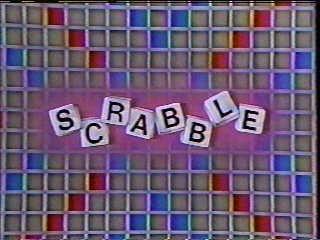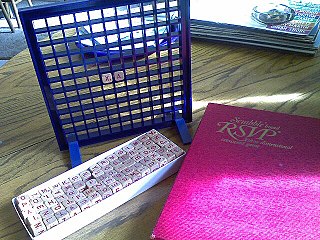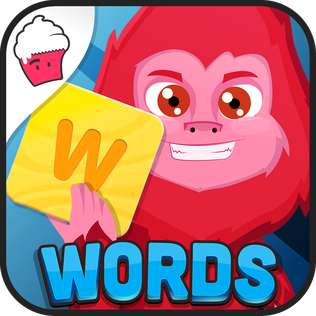Gameplay differences
The changes from standard Scrabble in Super Scrabble are summarized by the latter's tagline, "More spaces, more tiles, more points—add to your fun!" The board is larger; (21×21 or 441 squares vs. 15×15 or 225 squares); there are more premium squares (going up to quadruple letter and word score spaces); there are 200 tiles, twice as many as a normal Scrabble set. The middle 15×15 squares are identical to a Scrabble board, so standard Scrabble may be played on a Super Scrabble board. All the high-scoring quadruple premiums lie near the outside of the board, with the quadruple word squares at the four corners of the board.
Other than the differences in the board and the number of tiles, gameplay is similar to Scrabble. Each player has seven tiles in their rack as normal, scoring is the same, and the same word lists are used. However, the differences are enough to upset normal Scrabble strategies. For example, the fifty points earned from a bingo (using all seven tiles) is not nearly as significant when compared to the high final scores. For a two-player game, scores over eight hundred points are not uncommon.
Tournament-level Scrabble games are usually limited to two players. Many tournament players find games with more players cramped. With its larger board, Super Scrabble is ideally suited for three- and four-player games. Indeed, its scoring sheets do not have enough lines to keep score for most two-player games.
Super Scrabble has exactly twice as many tiles as Scrabble, but the distribution of letters is not simply the original distribution doubled. The distribution is:
- 4 blank tiles (scoring 0 points)
- 1 point: E ×24, A ×16
 , O ×15
, O ×15 , T ×15
, T ×15 , I ×13
, I ×13 , N ×13
, N ×13 , R ×13
, R ×13 , S ×10
, S ×10 , L ×7
, L ×7 , U ×7
, U ×7
- 2 points: D ×8, G ×5

- 3 points: C ×6
 , M ×6
, M ×6 , B ×4, P ×4
, B ×4, P ×4 - 4 points: H ×5
 , F ×4, W ×4, Y ×4, V ×3
, F ×4, W ×4, Y ×4, V ×3
- 5 points: K ×2
- 8 points: J ×2, X ×2
- 10 points: Q ×2, Z ×2
The  and
and  indicate modifications from double the original distribution, with
indicate modifications from double the original distribution, with  indicating more than double the original distribution, and
indicating more than double the original distribution, and  indicating fewer. Note, for example, that there are more than twice as many S's (ten, whereas standard Scrabble has four). This was done to make more opportunities for plurals and third-person singular verbs.
indicating fewer. Note, for example, that there are more than twice as many S's (ten, whereas standard Scrabble has four). This was done to make more opportunities for plurals and third-person singular verbs.
Strategy
Many of the same strategies that are applied in standard Scrabble play can be utilized in this version. Premiums play a larger role in Super Scrabble, due to both the presence of quadruple letter and word scores, and also because near the edge of the board, double word scores are spaced closely together, making it much easier to score a "double-double". In addition, opportunities for bingos are increased due to the three extra squares in each direction. For the same reason, hooks can play a larger part in strategy (a hook is a letter that can be played at the start or end of a word already on the board and as part of the same move in a new word in the cross direction).
Certain high scoring words that are impossible to make in Scrabble without using blanks, such as words with doubled Z's (e.g. FUZZ, JAZZ, DAZZLE), and words with doubled K's (e.g. KICK, KINK, KNOCK, KARAOKE), can be played. The word KNICKKNACK, with 4 K's, cannot be played in Scrabble because there is only 1 K and only 2 blanks - but it is possible to play this word in Super Scrabble. The same is true for words with four Z's, such as PIZZAZZ and RAZZMATAZZ. With quadruple-letter scores spaced only three squares away from a double-word score, it is not uncommon to see a single play score over one hundred points, even without a fifty-point bonus. Guarding against such plays becomes vital to strategy. However, due to the larger size of the board, this becomes increasingly difficult, especially late in the game.

Scrabble is a word game in which two to four players score points by placing tiles, each bearing a single letter, onto a game board divided into a 15×15 grid of squares. The tiles must form words that, in crossword fashion, read left to right in rows or downward in columns and are included in a standard dictionary or lexicon.

Upwords is a board game. It was originally manufactured and marketed by the Milton Bradley Company, then a division of Hasbro. It has been marketed under its own name and also as Scrabble Upwords in the United States and Canada, and Topwords, Crucimaster, Betutorony, Palabras Arriba and Stapelwoord in other countries. It is currently available as a board game and a digital gaming app.

Anagrams is a tile-based word game that involves rearranging letter tiles to form words.

Boggle is a word game in which players try to find as many words as they can from a grid of lettered dice, within a set time limit. It was invented by Allan Turoff and originally distributed by Parker Brothers.

Scrabble is an American television game show based upon the board game Scrabble. Contestants competed in a series of rounds to fill in words within a crossword puzzle for cash. Muriel Green of Exposure Unlimited developed the idea for a television game show based upon the board game concept. During 1983, Green convinced Selchow and Righter, who at that time owned the Scrabble board game, to license Exposure Unlimited to produce the game show. Exposure Unlimited co-produced the show with Reg Grundy Productions, and licensed the show to NBC. Scrabble aired on NBC from July 2, 1984, to March 23, 1990, and again from January 18 to June 11, 1993. Chuck Woolery hosted the program. Jay Stewart was the announcer for the first year. Charlie Tuna replaced him in mid-1985 and remained through the original run and the entirety of the 1993 revival.

Editions of the word board game Scrabble in different languages have differing letter distributions of the tiles, because the frequency of each letter of the alphabet is different for every language. As a general rule, the rarer the letter, the more points it is worth.

Alfapet was the original Swedish name for the popular word game Scrabble.
Scrabble variants are games created by changing the normal Scrabble rules or equipment.
Lexiko was a word game invented by Alfred Mosher Butts. It was a precursor of Scrabble. The name comes from the Greek lexicos, meaning "of or for words".

Francophone Scrabble is Scrabble in the French language. The governing body, the Fédération internationale de Scrabble francophone, has more than 20,000 members. Just as in English, points are scored by playing valid words from the lettered tiles. In French there are 102 tiles - 100 lettered tiles and two blanks known as jokers. The official word list for Francophone Scrabble is L'Officiel du jeu Scrabble.
In Scrabble, a challenge is the act of one player questioning the validity of one or more words formed by another player on the most recent turn. In double challenge, if one or more of the challenged words is not in the agreed-upon dictionary or word source, the challenged player loses her/his turn. If all challenged words are acceptable, the challenger loses his/her turn.
Bingo is a term used in North American Scrabble for a play in which a player puts seven tiles on the board in a single turn. Mattel, the game's manufacturer outside North America, uses the term bonus to describe such a word. In French, it is called a scrabble. A player who does this receives a 50-point bonus, which is applied after the rest of the play is scored.

Tile tracking is a technique most commonly associated with Scrabble and similar word games. It refers to the practice of keeping track of letters played on the game board, typically by crossing letters off a score sheet or tracking grid as the tiles are played. Tracking tiles can be an important aid to strategy, especially during the endgame when there are no tiles left to draw, where careful tracking allows each player to deduce the remaining unseen letters on the opponent's final rack. The marking off of each letter from a pre-printed tracking grid as the tiles are played is a standard feature of tournament play.

RSVP was a vertical version of Scrabble introduced by Selchow and Righter in 1958 and promoted as "3-D Scrabble". Two players spelled words using cubical tiles with letters on an upright grid board.

Scrabble ME is a variation of the classic board game Scrabble, where each player plays on their own small board as it is opposed to all players playing on one main shared board. It was published by Winning Moves Games USA in 2008.
Numble is a 1968 board game published by Selchow and Righter which is very similar to Scrabble. Instead of forming words, players form sequences adhering to certain arithmetic and numerical constraints.

The Computer Edition of Scrabble, also known as Computer Scrabble is a computer version of the board game Scrabble, licensed from J. W. Spear & Sons and released by Little Genius for the Apple II in 1982. It was subsequently released for most home computers of the time.

Words with Friends is a multiplayer computer word game developed by Newtoy. Players take turns building words crossword-puzzle style in a manner similar to the classic board game Scrabble. The rules of the two games are similar, but Words with Friends is not associated with the Scrabble brand. Up to 40 games can be played simultaneously using push notifications to alert players when it is their turn. Players may look up friends either by username or through Facebook, or be randomly assigned an opponent through "Smart Match". Players can also find potential opponents using Community Match.

Scrabble Showdown is an American game show created for the American cable network The Hub. The program was based on the board game Scrabble and was hosted by Justin Willman. It ran from September 3, 2011, to April 15, 2012.

Words of Gold is a multiplayer word game developed by Cupcake Entertainment. It was released in November 2014 for Facebook, December 2015 for Android, and February 2016 for iOS.















